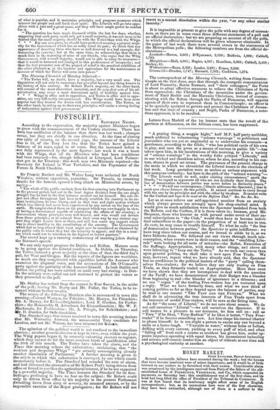" A prating thing, a magpie hight," half M.P. half
party-scribbler, much addicted to volunteering "solemn warnings" to politicians and journalists who are yet so ungrateful as to undervalue his counsels—a gentleman, according to the Globe, " who has political cards of his own to play, and uses the press as a means of success in public life "—has taken upon him, in his lucubrations of this morning, to give a variety of "solemn warnings" to the worthy folks ycleped "Liberals," and to our wicked and thankless selves, whom he also, according to his cus- tom, abuses in good set terms. The gravamen of the present charge is the mode in which we chronicled the Liberal losses in the elections of last week. Long quotation were as useless as serious argument with this pompons verbosity; but here is the pith of the " solemn warning " The Liberals would do well, under existing circumstances," qnoth the Oracle, " to regard as opponents all who are not decidedly their friends. The line of demarcation between parties was never before so distinctly drawn." • • • " We tell our contemporary, [Oracle addresses the Spectator,] that it must now choose between the two parties. It cannot continue to curry favour with the one by its principles and with the other by its abuse. It cannot write for the Carlton and hope to be read at the Reform Club." &c. &c. &c. &c.
Let us at once relieve our self-appointed monitor from an anxiety which always presses too strongly upon his shop-excited mind. It would give us much satisfaction were the Spectator banished from both the Reform and the Carlton, if it is there taken in ; because, good Mr. Shopman, those who honour us with perusal under cover of their an- nual subscriptions to "the Club," would then have to become indivi- dual subscribers to the paper—in the proportion of at least ten to one, Au rests, he may cease to trouble himself: To what he calls "the line of demarcation between parties," the Spectator is quite indifferent : we have long since taken our course, and we intend to abide by it, as we have hitherto done. We followed out our views through much mis- conception, when events were in their causes, and the "confiding Libe- rals" were looking for all sorts of miracles—the Ballot, Extension of the Suffrage, Appropriation, with many other things, and above all were laboarieg to "keep out the Tories.' As we took our course then upon general politics, we shall take it now upon Free Trade. We may, however, repeat what we have already said, that the Spectator has no confidence in the political leaders of the " party " calling them- selves Free-traders; for we believe they are only trading on Free Trade, as they formerly traded on Appropriation. More than once we have shown that they are incompetent to deal with the question of the Tariff; we have demonstrated that their Budget was a blunder from beginning to end—the blunder of ignorance in a dilemma ; and no one " organ " of the trading Free-traders has yet ventured upon a reply. What we have formerly done, and what we now think of coming politics so far as they depend upon the balance of parties, may be read in our resume "THE PAST AND THE FUTURE." What we shall do in advocating the true interests of Free Trade apart from the interests of sordid Free-traders, will be seen at the fitting time.
As for " the name of Liberal," we do not care about names. We do not call ourselves " Liberal"—we call ourselves the Spectator. If to call names be a pleasure to our detractor, let him call on : call as " Tory " if he likes, " Tory-Radical " if he likes it better, " Tory Free- trader" if he fancies something new. Let him shape his eternal chatter to please himself: he is too slight a person to excite any one beyond a smile or a horse-laugh. "Unstable as water," without helm or ballast, drifting with every current, yielding to every puff of wind, and often "falling off" from such a course as accident has given him, under op- posite impulses operating with equal forces, his inconsistent imbecility and solemn self-conceit render him an object of ridicule at one time and a psychological curiosity at another.


























 Previous page
Previous page